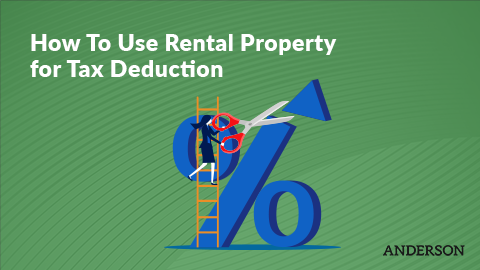
When you own rental property, the tenant’s rent isn’t the only income you receive. The Internal Revenue Service views a variety of other payments as income, such as tenant-paid expenses, tenant-provided services, and the portion of the security deposit you put toward the property. Because all these income sources are taxable, the amount you can put in your pocket can decrease significantly depending on your circumstances.
Fortunately, as a rental property owner, you can claim several deductions to lower your tax liability come filing season. Here, we explain how to use rental property for tax deductions by taking advantage of nine common expenses in property ownership.
Key Takeaways:
- Claiming deductions on your rental properties reduces your tax liability.
- Expenses related to purchasing, operating, and maintaining your rental properties are deductible. That includes the interest paid on your mortgage, the depreciation of your property over time, your property taxes, and your travel expenses.
- There are also some uncommon deductions you can use to your advantage, such as insurance premiums, repairs, and miscellaneous expenses associated with conducting a rental business.
Tax & Asset Protection Workshop
Learn about Real Estate & Asset Protection at our next
FREE LIVE STREAM
How To Use Rental Property for Tax Deductions
Owning a rental property comes with an array of responsibilities and associated expenses. However, you can deduct those expenses if they relate to the purchase, operation, and maintenance of your property. The following rental property tax deductions can significantly reduce your tax bill, increase your profits, and facilitate your success as a rental property owner:
Mortgage Interest
Like homeowners, rental property owners often take out mortgages to purchase their real estate, and the interest accrued on their loans tends to be one of their largest operating expenses. With a mortgage interest deduction, however, they can subtract their interest charges from their total taxable amount. The deduction limit varies depending on when you took out your mortgage. For mortgages from before Dec. 16, 2017, the limit is $1 million; for those that came after, it’s $750,000.
Bear in mind that the mortgage interest deduction relates only to interest charges. It doesn’t apply to the portion of your payment that goes toward your principal. Fortunately, as a rental property owner, you won’t have to keep track of how much interest you’ve accrued on your loan. Within the first couple of months of each year, you should receive an IRS Form 1098 from your mortgage lender, which indicates how much interest you paid in the applicable tax year.
Property Depreciation
Depreciation refers to the gradual reduction in an asset’s value over time. Even with a rental property, which has a high likelihood of increasing in value as time passes, tax law allows the owner to deduct depreciation as an expense to account for wear, tear, and obsolescence, as well as modifications that may improve or add value to the property, such as new appliances or furnishings.
Depreciation isn’t a one-off deduction; rather, you apply it across a property’s useful life — the amount of time that it’s estimated to remain in profitable service. As the IRS sets the useful life of a rental property at 27.5 years, you can use the straight-line method (asset cost minus salvage value, divided by the useful life) to calculate your yearly deduction.
It’s worth noting that you can start to claim depreciation as soon as your property becomes available to rent. You can also apply the deduction to other items that allow you to conduct your rental business, such as vehicles and office equipment.
Property Taxes
Property owners generally pay tax on every property they own. Depending on where the properties are located, that could amount to hundreds of thousands of dollars annually. However, with the property tax deduction, you can write off a portion of the taxes as an expense. If you only have passive participation in rental activities, the deductible limit is $10,000, or $5,000 for married owners filing separately (that applies to your property taxes combined with either state/local income taxes or sales taxes).
The limit doesn’t apply to business activities, however, so a higher level of involvement may allow you to write off all your property taxes.
Repairs
When you must perform or pay for repairs to a property, the associated expenses are deductible in the year in which they apply. The term “repair” doesn’t refer only to fixing broken appliances. Painting the walls, cleaning the gutters, and replacing components also qualify as repairs. If you perform the repairs yourself, you could deduct the costs of materials and tools. If you hire a repair professional or you have hired a property manager, you will deduct the cost of their labor.
Be careful not to conflate repairs with improvements that must be capitalized as depreciation. What distinguishes repairs is that they don’t necessarily add value to your property; instead, they’re necessary to keep your property in a rentable state. In contrast, improvements aren’t necessary but help increase the property’s usefulness to renters. Below are some examples of improvements that would probably need to be capitalized as depreciation:
- New HVAC systems.
- New roofs.
- Room additions.
- Security systems.
- Sprinkler systems.
- Storm doors or windows.
- Updated flooring.
Travel Expenses
Part of operating a rental property involves traveling to your properties to maintain them, show them to prospective renters, or collect rent. Because those activities are necessary to your business operation, the travel expenses you incur are likely to be deductible.
If you’re using your vehicle to travel to your properties, you can choose between methods for deducting your travel expenses. One is to calculate your actual expenses or the sum of actual costs spent on your vehicle by the end of the year — gas, insurance, maintenance, and such. The other method is to base your expenses on the standard mileage rate, which amounts to 65.5 cents per mile for business use.
If you must travel a greater distance than your vehicle can reasonably cover, many of the costs related to your trip may be deductible as well, such as:
- Travel fare (e.g., planes, trains, ridesharing).
- Lodging.
- Laundry and dry-cleaning.
- Telephone calls related to your property.
Other Rental Property Deductions You Can Use to Your Advantage
Aside from those discussed above, there are other, less common deductions you can use to reduce your tax bill, such as:
- Insurance premiums: If your mortgage lender requires you to take out an insurance policy, your premiums are deductible as a necessary expense. Should you have employees as part of a rental business, their health insurance and workers’ compensation premiums are also deductible.
- Utilities: If you cover your tenants’ utilities, including water, gas, electricity, HVAC, internet, and cable, you can deduct those expenses as well. In the event that your tenants reimburse you for your utility coverage, you can claim the reimbursement as income and continue to write off the utilities as deductible expenses.
- Home office expenses: Highly involved rental property owners may need a dedicated workspace to keep pace with their business activities. The expenses of setting up and maintaining said workspace may be deductible.
- Miscellaneous business expenses: An array of other activities may be deductible if they’re associated with the operation of your rental business. That includes but isn’t limited to legal fees, accounting fees, advertising costs, and lawn care expenses.
To maximize your deductions and minimize your tax liability, make sure to examine all the expenses that could be associated with your rental property activities. Should you need help determining which deductions you’re eligible for, we invite you to get in touch with us at Anderson Advisors.
Corporate Transparency Act – Do You Have To File? Learn if you have to file by taking this easy 6 step quiz.
Free Strategy Session with an Anderson Advisor
Receive a detailed risk assessment to assist in lowering problem areas that could wipe out all of your assets with one wrong move. Speak with an Anderson Professional Advisor to get your FREE Strategy Session. Limited-Time Offer: FREE (a $750 value.)












